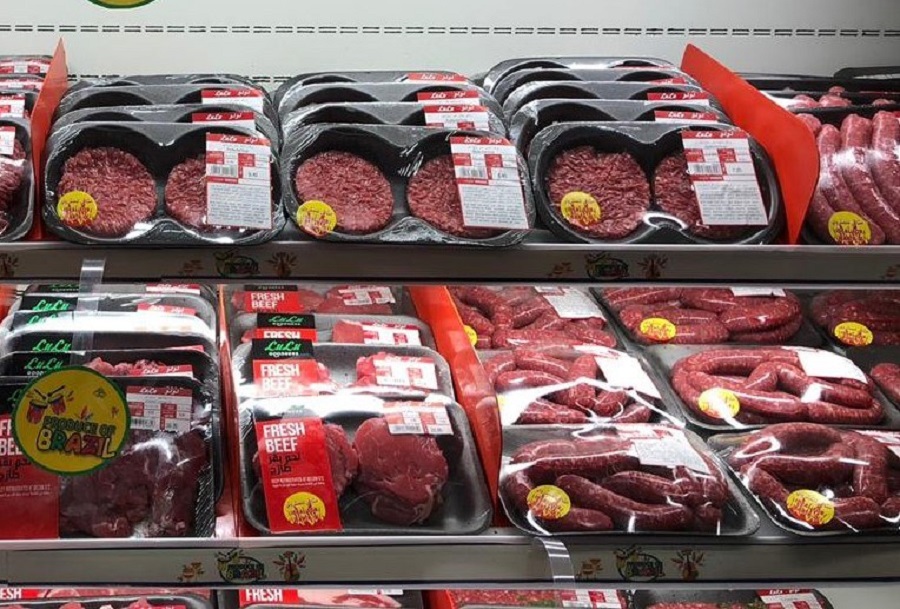RIO DE JANEIRO, BRAZIL – The ease with which Silvio de Oliveira, 48, talks about the hundreds of millions of Chinese who have prospered in recent years and the epidemic of swine fever that forced sacrificing a third of the herd in the Asian country is surprising: this is the Municipal Market of São Paulo and he is not an international relations analyst.
Oliveira owns two huge kiosks -‘Boi Feliz’ and ‘Porco Feliz’- with over 100 employees and 30 years of experience in the sector.

He says that the price of meat has never risen so much in such a short time (that is, since the hyperinflation of the 80s). “In the last 40 days, the price of meat has risen by 30 percent”. Suddenly, ordinary Brazilians suffer the consequences of a mixture of the effects of globalization and internal politics.
This is one of the most talked-about issues this month; it has been included in political debates, in specialized news about prices, such as André Braz of the Getúlio Vargas Foundation’s Institute of Economics, who alerts that “there is still room for further increases”.
A sudden and unexpected threat to the Brazilian institution that is the family Sunday BBQ. Despite the advances of veganism in the country, Brazil is one of the countries consuming the most meat (77 kilos per year per inhabitant) and the second-largest beef producer, with more than 10 million tons in 2018, 16 percent of the world total.
The butcher details that the kilo of picanha, the most expensive cut, is costing R$45 (US$11.25). The sharp increase is due to a combination of internal and external factors that have formed a perfect storm that hits Brazilians’ pocketbook hard just before Christmas, but has excited meat exporters.
“On the one hand, we have an increase in demand for beef and pork at [Christmas] parties and, on the other hand, there is a very high demand from China, driven by restrictions in other markets, which coincided with the devaluation of 16 percent of the Brazilian real in November, making exports more profitable,” Braz explains.
The demand is such that Brazilian meat producers cannot simultaneously satisfy the appetites of their countrymen and the Chinese. From January to October, the Asian giant imported 320,000 tons of Brazilian beef, which boosted exports by 11 percent during this period.
Uruguay experienced a similar situation in August when the strong increase in beef sales to China forced it to import lower-quality beef from Brazil, Paraguay, and Argentina.
The Chinese used their checkbooks and offered higher prices to Brazilian cattle ranchers to cover the increased demand caused by the fierce swine fever that affected all their provinces and by the suppliers they lost as a result of the trade war waged by US president, Donald Trump. This is the effect coming from abroad.
The reasons for the increase in domestic demand are different.
Brazilians have just received the first installment of their 13th month’s salary, coupled with the fact that Jair Bolsonaro’s government authorized workers to withdraw up to R$500 from the FGTS (Severance Premium Reserve Fund) as of September, in an attempt to reinvigorate the economy.
It is working because GDP rose 0.6 percent in the third quarter, which places growth from January to September at one percent.
Economist Braz predicts that “demand will stabilize” after the holidays. The owner of ‘Boi Feliz’ expects a similar growth, but explains it differently: “We still sell because it is the end of the year, although consumption has decreased. But when January and February come, the situation will be bad”. For him and his clients, it is clear.
Darinka Zepeda, 46, is among those affected. Every day she goes to the Central Market to buy ten kilos of minced meat -on Fridays, it is 20 kilos- to supply the burger place she built with her husband in 2017. Tired of having bosses, they wanted to venture.

“I buy a very good quality blend of Angus, which they make for me here. In the beginning, the kilo cost R$15.80; then it went up to R$17.80 and in the last three weeks it went up to R$25.80,” she explains.
Pork and chicken cuts have also increased due to the growth in demand from those who cannot pay for beef. Butcher Oliveira says pork is 40 percent more expensive than last month, something unprecedented. He says he has not passed the increases on to customers. “If I do that, I lose all my customers,” says the owner of ‘Boi Feliz’. Zepeda reasons likewise.
She is one of those who believe that the price will drop. But if it doesn’t, the couple already has a plan B: “If at the beginning of the year it doesn’t drop, we’ll buy directly from the slaughterhouse, we’ll buy a machine and we’ll grind the meat ourselves,” says the Chilean woman whose parents brought her to Brazil after Pinochet’s coup d’état. “In Chile, I was very poor, I didn’t eat meat,” she recalls from her childhood.
Source: El Pais

